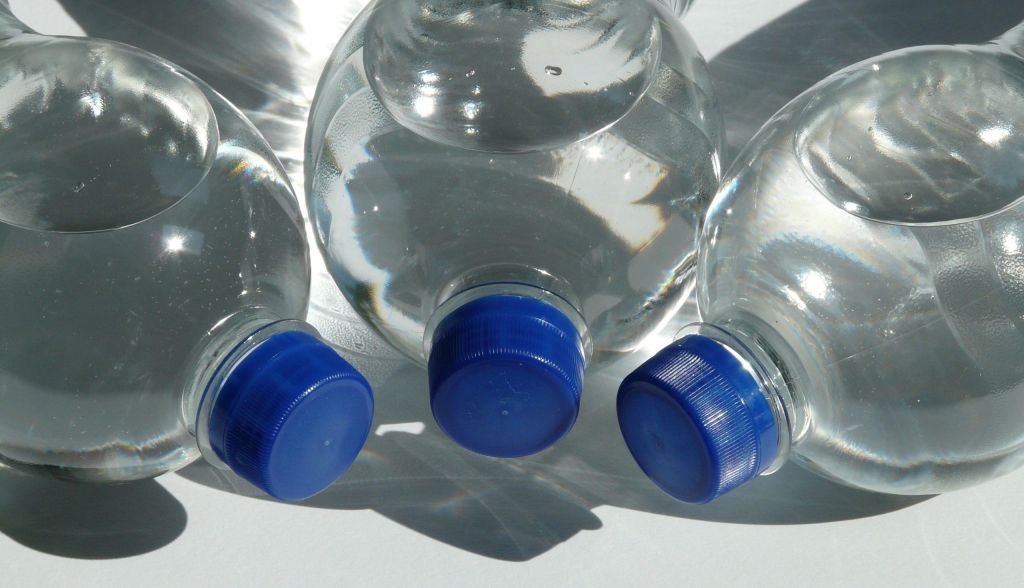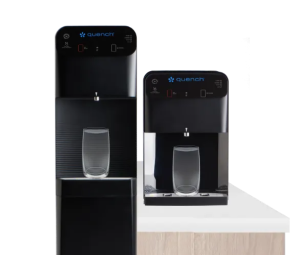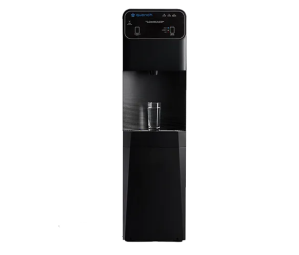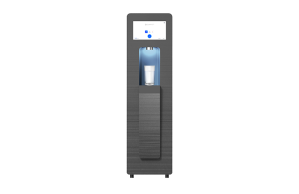
Does water expire?
As long as bottled water is produced according to Current Good Manufacturing Practice (CGMP) regulations, it has an indefinite shelf life. In other words, bottled water doesn’t expire. However, plastic bottles may degrade over time, so it’s common to see a best-by date on the packaging. Keep in mind that this only applies to plain water. If you buy bottled water with additives, those additives may break down over time, causing the water to have a foul taste or odor.
Unlike jugs and bottled water, water from point-of-use bottleless water coolers is not at risk of expiring. These coolers pull fresh water directly from your building’s existing waterline and pass it through several stages of filtration, including reverse osmosis, carbon filtration and in-tank UV sanitization, ensuring a continuous supply of clean and safe water. This advanced filtration system eliminates common concerns related to bottled water storage, such as plastic degradation and leaching.
This article provides more information on water safety, including how long water lasts and how to store it according to the OSHA drinking water requirements. You’ll also learn about the risks associated with water storage and find out how to mitigate them in offices and other business environments.
How long does water last?
Since it’s made up of stable elements and has no expiration date, it lasts indefinitely, and there’s no risk of it going bad. However, you should replace stored water every 6 months.
To maximize the shelf life of your water, store it in a cool environment. The temperature should range from 50 to 70 degrees Fahrenheit. When storing water long-term, it’s also important to keep it out of direct sunlight and away from harmful chemicals. For example, you shouldn’t store water in the same place you store fertilizer, motor oil, or copier toner.
Water storage risks and safety
Although you need water to survive, there are some risks associated with consuming it, especially if you rely on bottled water. Over time, plastic breaks down in a process known as degradation. This impairs its structural integrity, causing microplastics to form. As their name implies, microplastics are tiny plastic particles. In 2024, CNN reported that bottled water may contain 10 to 100 times more of these particles than previously estimated.
Some water bottles also contain per- and polyfluoroalkyl substances, better known as PFAS. When exposed to heat or sunlight, these chemicals can leach into your water, increasing the risk of poor health outcomes. Certain levels of PFAS exposure may contribute to the following:
- Developmental delays in children
- Increased risk of obesity
- High cholesterol
- Reduced fertility
- High blood pressure during pregnancy
- Increased risk of certain cancers
- Impaired immune function
- Undesirable hormonal changes
Bottled water vs. dispensers
Bottled water is readily available, but it’s not always the best option, especially in a business environment. Many companies struggle to find extra shelf space, making long-term water storage difficult. Even if you have plenty of room, high temperatures can affect bottled water quality, increasing the risk of PFAS exposure. Drinking from warm bottles is a risky practice that businesses can avoid by switching to bottleless water coolers.
Unlike bottled water, point-of-use bottleless coolers provide a continuous supply of freshly filtered water without the need for jugs or storage. These systems reduce concerns about plastic degradation, leaching, and environmental waste. Businesses can enjoy cleaner, safer water while minimizing the harmful impact of disposing of single-use bottles and jugs.
For workplaces that want to offer both still and sparkling options, consider installing a sparkling water dispenser, such as the 533 Touchless Sparkling Water Dispenser. These systems allow you to meet employee preferences while keeping your operations efficient and environmentally friendly.
By replacing bottled water with bottleless coolers and sparkling water dispensers, companies can streamline hydration solutions, avoid plastic waste, and ensure consistent access to safe, high-quality drinking water.
Storing water long term: How to store in the office
As noted previously, you should keep water away from direct sunlight and harmful chemicals. If you plan to store water for several months, write “Drinking Water” on each container. Add the date to the container to make it easy to determine which containers need to be discarded after 6 months. Finally, store water in a cool, dry place to prevent leaching and preserve the taste.
It’s also helpful to follow these tips:
- Store water at temperatures ranging from 50 to 70 degrees Fahrenheit.
- Rotate stock regularly.
- Keep enough on hand for all employees.
Let’s explore each of these tips in more detail.
1. Store water at temperatures ranging from 50 to 70 degrees Fahrenheit
The components of plastic are held together by chemical bonds. These bonds are more likely to break down at high temperatures, so it’s important to prevent bottled water from getting too warm. Plus, not many people enjoy drinking lukewarm water when they could be drinking something cool and refreshing.
Leaching doesn’t occur in cold temperatures, but if it’s too cold, the water may freeze. As water freezes, it expands, increasing the risk of cracks in plastic bottles and jugs.
2. Rotate stock regularly
Appoint at least one of your employees to rotate your water stock regularly. The designated individual should check the date on each container and remove it from the storage area if it’s more than 6 months old.
3. Keep enough on hand for all employees
If your company is growing rapidly, revisit your water storage needs every few months. You may need to purchase additional bottles for your water cooler or order extra cases of bottled water from your supplier. Staying on top of your storage needs is a great way to ensure you stay in compliance with the OSHA requirements.
Does water go bad?
Stored water doesn’t go bad, but you should rotate your stock regularly to ensure employees always have access to the freshest-tasting water. If you’re hampered by a lack of shelf space, minimal filtration options or other challenges, consider a bottle-free water cooler.
Bottle-free coolers provide a continuous supply of filtered water, meeting OSHA drinking water requirements without the need for storage or frequent maintenance. They also reduce the risk of exposure to PFAS and other harmful substances, delivering cleaner, safer water directly to your team. Schedule a free consultation to explore the best hydration solutions for your workplace.
Recommended products
Culligan Quench has an advanced suite of point-of-use systems that are designed to meet the needs of workplaces of all shapes and sizes. Here are some products we recommend for your business.
Q8 Touchless Bottleless Water Cooler
Available with quenchWATER+ electrolyte water

Q12 Touchless Bottleless Water Cooler
Available with quenchWATER+ electrolyte water
